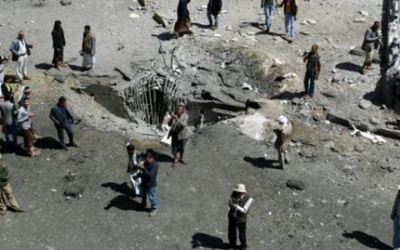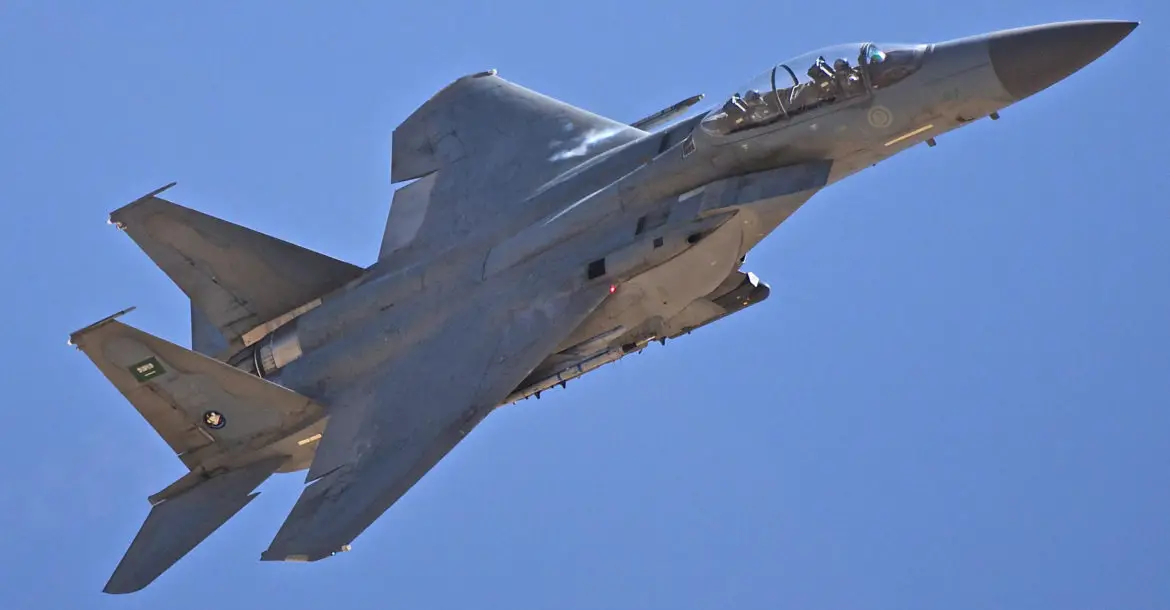Yemen: First Bomb the Wedding, then Bomb the Rescue Workers

Textbook terrorist tactic and war crime – who cares?
In an impoverished, remote mountain village in northwest Yemen, the wedding celebration was still going strong when the first airstrike hit around 11 p.m. on April 22. The Saudi attacks killed the bride first death toll to “at least 33 people.” The nearest hospital was miles away in Hajjah. The only two cars in the village were knocked out by the bombing. The first casualties reaching the hospital arrived by donkey after midnight. The hospital, one of 13 in Yemen run by MSF (Medecins Sans Frontieres, or Doctors Without Borders), had two ambulances that drove back and forth well into daylight bringing in the wounded sometimes six at a time. MSF reported receiving 63 casualties, none armed, none in uniform:
The injured had mainly lost limbs and suffered shrapnel wounds. At least three patients required amputation, including two brothers, who each lost a foot. By early morning, many residents of Hajjah had come to the hospital to donate blood. In two hours, 150 bags were collected to treat the wounded.
This was yet another American-sponsored war crime. The US has committed war crimes of this sort all on its own since 2009 in Pakistan (and subsequently in Iraq, Afghanistan, Syria, and elsewhere). The US president surely knew such attacks are war crimes under international law as well as US law, but who was going to hold him accountable (any more than anyone has held his predecessor or successor accountable)?
US complicity in committing war crimes almost daily in Yemen began in March 2015 when the president, without a murmur from a supine Congress, gave the green light to a Saudi-led coalition of mostly Sunni Arab states to wage a genocidal bombing campaign against the Houthi rebels (predominantly Shi’ite Zaidis) who had ruled Yemen for 1,000 years until 1962. In 2014, the Houthis had overthrown the duly-appointed, internationally-imposed “legitimate” government. Americans’ hands have run red with innocent Yemeni blood ever since. (Not that US media often mention US involvement, as the CNN report on this deadly wedding illustrates: “A coalition led by Saudi Arabia has been fighting Iranian Houthi rebels in Yemen for more than two years” — actually three. And the Houthis are Yemeni, not Iranian, as the official propaganda would love you to believe.)
As with the desecrated wedding described above, the Saudis, with US blessing and extensive tactical support, like to commit their war crimes especially against weddings and funerals (as the CIA was fond of doing in Pakistan). This is state-sponsored terrorism. The states sponsoring it include the US, Saudi Arabia, the UAE, and their allies in Yemen. Weddings and funerals offer large gatherings of innocent people who are defenseless. It doesn’t take a smart bomb to see the value of a soft target like that. When the rescue workers and other first responders show up, a second strike kills more innocent, defenseless people. This is a standard terrorist tactic with fiendish efficiency. In terror jargon it’s called the double-tap.
Image on the right: A Royal Saudi Air Force F-15, February 28, 2011. (Source: Sgt. Erica Knight)

That same weekend, US-Saudi strikes also killed a family of five and 20 civilians riding in a bus. The US-Saudi air war on the undefended country (Yemen has no air force and limited air defenses) has displaced millions of people in a country of 25 million that was already the poorest in the region when the Saudis attacked. The relentless bombing of civilians (including the use of cluster bombs) has led to severe hunger, approaching famine conditions; a severe shortage of medical supplies and a massive cholera outbreak; and destruction of infrastructure and the near-elimination of clean water. Describing conditions in Yemen, UN Secretary-General Antonio Guterres said:
Every 10 minutes, a child under 5 dies of preventable causes. And nearly 3 million children under 5 and pregnant or lactating women are actually malnourished. Nearly half of all children aged between 6 months and 5 years old are chronically malnourished and suffer from stunting, which causes development delays and reduced ability to learn throughout their entire lives.
This is what genocide looks like. But to blur that perception, the Saudis and the UAE have given the UN nearly $1 billion in humanitarian aid, to ameliorate the humanitarian disaster they created, even as they continue bombing without a pause. This picture has prompted Guterres to say that “peace is possible” in Yemen, but “there are still many obstacles to overcome.”
One such obstacle would be the Saudi claim on April 21 that the Yemeni rebels had seized 19 oil tankers off the coast and had held them hostage for more than 26 days. That was a lie. It was not a credible lie, coming after 25 days of silence during the alleged hostage crisis. It was a lie based on nonsense, since the Saudi naval blockade had allowed the oil tankers into the port of Hodeidah to deliver fuel to the rebel-held area. A commercial shipping traffic website soon located all the “hostage” ships and learned that they were anchored awaiting off-loading. On April 26, Public Radio International exposed the Saudi lie.
On November 13, 2017, the US House of Representatives passed a lengthy resolution (H.Res.599) “Expressing the sense of the House of Representatives with respect to United States policy towards Yemen, and for other purposes” on a bipartisan vote of 366-30 (with 36 not voting). The resolution expresses basic clichés of US policy, with all their varied levels of inaccuracy, dishonesty, and wishful thinking. The general tone of the document is that it’s all Iran’s fault the US-Saudi offensive is killing Yemenis en masse (no evidence offered). Most to the point, the House acknowledges that the US has no legal authorization for the use of force in Yemen (while omitting specific reference to US participation in the bombing, naval blockade, drone strikes, or other military actions). Having identified the illegality of US involvement in a genocidal war, the House resolution does nothing about it other than to ask all the parties to play nice.
In March 2018, Senate Joint Resolution 54 raised some real issues without actually proposing any solution. The resolution defined itself as a choice:
“To direct the removal of United States Armed Forces from hostilities in the Republic of Yemen that have not been authorized by Congress.”
As explained in a Bernie Sanders press release:
It is long past time for Congress to exercise its constitutional authority on matters of war, and if the United States is going to participate in the Saudi-led war in Yemen, there must be a debate and a vote. Otherwise, our involvement is unauthorized and unconstitutional, and it must end.
In a largely party-line vote on March 20, the Senate Republicans voted 55-44 to table the resolution without discussing it or changing the course of carnage and US arms sales.
The Yemen peace process is still a hope more than a reality. The US and the Saudi coalition have shown no willingness to negotiate in good faith, but it’s not clear that anyone else has either. The Houthis control most of western Yemen and roughly 80% of the population. Houthi senior leader Saleh al-Sammad, considered a moderate, was open to negotiation. On April 19, a US-Saudi airstrike assassinated him.
The Trump administration is equally useless in any search for peace in Yemen. The president is enthralled by the scale of arms purchases by the Saudis and their allies, with no apparent interest in how the Pentagon helps use those weapons mostly against civilians.
A US citizen named Nageeb al-Omari has attempted to bring his 11-year-old daughter Shaima to the US for medical care. She was born with cerebral palsy, but the US-Saudi bombing has made her care all but impossible there. There is no US embassy in Yemen. Shaima’s father took her to Djibouti, where she continued deteriorating rapidly. Despite the US anti-Muslim travel ban, the daughter qualifies for the exemptions that would allow her into the US. Even though her father is a US citizen, US State Department officials would not grant her a visa, a waiver, or, most likely, a chance to live. The family has returned to Idlib in Yemen to await the next random act of cruelty from a rogue state that is the world’s greatest purveyor of terrorism.
Why should they expect any better treatment than Iraqi Christians in Michigan who voted for the president and now face deportation?
*
This article was originally published on Reader Supported News.
William M. Boardman has over 40 years experience in theater, radio, TV, print journalism, and non-fiction, including 20 years in the Vermont judiciary. He has received honors from Writers Guild of America, Corporation for Public Broadcasting, Vermont Life magazine, and an Emmy Award nomination from the Academy of Television Arts and Sciences.

